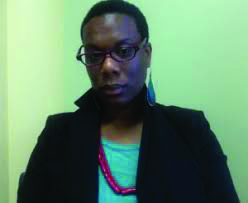Join us this semester at the Bull's Head Bookshop for the 2020 edition of our Author's Discussion Series. All discussions are free and open to the public and take place at 3:30pm on the 2nd floor of the bookstore. Each year, we invite authors and scholars to share their newest research on topics in African American and African Diaspora history and culture. This year's lineup includes:
January 30, 2020: The Black Shoals (Duke Press, 2019) by Tiffany Lethabo King

Tiffany Jeanette King
In The Black Shoals Tiffany Lethabo King uses the shoal—an offshore geologic formation that is neither land nor sea—as metaphor, mode of critique, and methodology to theorize the encounter between Black studies and Native studies. King conceptualizes the shoal as a space where Black and Native literary traditions, politics, theory, critique, and art meet in productive, shifting, and contentious ways. These interactions, which often foreground Black and Native discourses of conquest and critiques of humanism, offer alternative insights into understanding how slavery, anti-Blackness, and Indigenous genocide structure white supremacy. Among texts and topics, King examines eighteenth-century British mappings of humanness, Nativeness, and Blackness; Black feminist depictions of Black and Native erotics; Black fungibility as a critique of discourses of labor exploitation; and Black art that rewrites conceptions of the human. In outlining the convergences and disjunctions between Black and Native thought and aesthetics, King identifies the potential to create new epistemologies, lines of critical inquiry, and creative practices.
March 5, 2020: In This Land of Plenty (UPENN Press, 2019) by Benjamin Talton

Benjamin Talton
In This Land of Plenty presents Congressmen Mickey Leland as the embodiment of larger currents in African American politics at the end of the twentieth century. But a sober look at his aspirations shows the successes and shortcomings of domestic radicalism and aspirations of politically neutral humanitarianism during the 1980s, and the extent to which the decade was a major turning point in U.S. relations with the African continent.
March 26, 2020: The Racial Politics of Division (Cornell Univ. Press, 2019) by Monika Gosin

Monika Gosin
The Racial Politics of Division deconstructs antagonistic discourses that circulated in local Miami media between African Americans, "white" Cubans, and "black" Cubans during the 1980 Mariel Boatlift and the 1994 Balsero Crisis. Monika Gosin challenges exclusionary arguments pitting these groups against one another and depicts instead the nuanced ways in which identities have been constructed, negotiated, rejected, and reclaimed in the context of Miami's historical multiethnic tensions.
April 2, 2020: Physics of Blackness (UMN Press, 2015) by Michelle Maria Wright

Michelle Maria Wright
What does it mean to be Black? If Blackness is not biological in origin but socially and discursively constructed, does the meaning of Blackness change over time and space? In Physics of Blackness: Beyond the Middle Passage Epistemology, Michelle M. Wright argues that although we often explicitly define Blackness as a “what,” it in fact always operates as a “when” and a “where.”